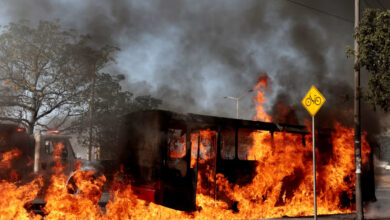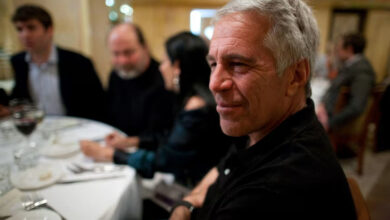
Zero-sum confrontations and perpetual casualties define the Middle East, amid grim scenarios for a region now hostage to Israeli expansionist ambitions and Tel Aviv’s recklessness, all under unrestrained US support and a pragmatic Western vision that disregards our region’s security and stability.
In this bleak landscape, former US Department of Defense official and Professor of National Security Affairs at the US Naval Postgraduate School (NPS), James Russell, warned that US President Donald Trump could drive the region and the world into further bloodshed if he risks targeting Iran’s Fordow nuclear facility.
Russell stressed that toppling the Iranian regime is not as simple as Israeli Prime Minister Benjamin Netanyahu wishes; rather, this is a delusion stemming from Israel’s overconfidence in its capabilities.
He predicts that the war will be prolonged.
Russell served in the Office of the Assistant Secretary of Defense for International Security Affairs from 1998 to 2001 and traveled across the Middle East shaping US security policy. He holds a PhD. in War and National Security from the University of London and currently teaches at the NPS, one of the Pentagon’s premier academic institutions, which trains and develops future defense and national security leaders.
Interview:
Q: How do you view the ongoing war between Iran and the Israeli occupation? Who do you hold responsible? Do you support the US’s alignment with Israel?
• This war is part of a long-standing historic animosity between Iran and Israel that spans at least 25 years. During this period, Tel Aviv and Tehran have engaged in a covert war—avoiding direct military confrontation in favor of secretive programs. That said, Israel has indeed now assassinated Iranian officials linked to the nuclear program, constituting an act of war.
What we see now is not a spontaneous eruption. Hamas’ October 7th attack brought this latent conflict to the surface. Israel’s brutal and devastating response—described by many as a genocidal war in Gaza—was followed by renewed tension in Syria, prompting Tel Aviv to settle scores with Hezbollah and address the political crisis in Lebanon.
Netanyahu has aimed to spark a broader regional war involving Iran, hoping the US would shoulder most of the fighting. He has long tried to ensnare US presidents—from Trump to his predecessors, including Bill Clinton—into launching military action against Iran, especially targeting its nuclear sites.
The recent Israeli attack on Iran, expanding beyond nuclear facilities to include assassinations of government officials and strikes on energy infrastructure, reflects a longstanding Israeli goal: regime change in Tehran.
Ultimately, Netanyahu wants the US to engage directly and publicly in this war. There’s clearly tight coordination between US and Israeli intelligence and security services.
Trump misled the Middle East, creating the illusion of tripartite coordination among Israel, Iran, and the US during nuclear negotiations. But that illusion was never real.
Moreover, the US faces pressure not just from Israel but from “war hawks” and arms industry profiteers pushing for broader conflict with Tehran to serve their interests.
Q: What is your assessment of Iran’s ability to penetrate Israeli depth and strike Tel Aviv?
• In any war, the side that initiates it believes it is prepared and capable—assessing its strength and that of its adversary. Iran has proven its ability to launch strikes reaching Israeli villages. This is noteworthy. I believe this war holds many surprises.
Political leaders often overestimate their capabilities and fall victim to self-deception, especially during wartime. The US invasion of Iraq in 2003 is a clear example. Israelis now face the same lesson—they believed their press statements about their army’s might, but are now realizing the enemy can strike back. However, the adversary has advanced defensive systems and can protect itself.
Things aren’t unfolding as planned.
Q: Can Netanyahu easily topple the Iranian regime?
• Netanyahu is learning that a “regime change” in a country of 90 million people like Iran is no simple task. The idea that a few bombings will cause Iran’s regime to collapse due to internal weakness is pure fantasy—borne of Israel’s inflated self-confidence and its own propaganda.
Q: Following the Israeli National Security Minister’s threat to strike the Fordow facility, do you believe Tel Aviv can act alone, or will the US get dragged into another regional quagmire like Iraq?
Israel cannot strike the fortified Fordow facility alone, nor can it dismantle Iran’s nuclear infrastructure with air raids. You can’t bomb away Iran’s nuclear program. That was true before the attacks—and remains so.
One core objective of Israel’s strategy is to pull the US into direct conflict with Tehran. The ball is now in the American president’s court. Sadly, the reality is that if Trump targets Fordow, the world will plunge into more senseless bloodshed.
It’s a tragedy for humanity. And as always, innocent civilians will bear the brunt.
Q: What are your predictions for the future of this war?
I don’t think diplomacy is entirely off the table, but chances are slim. The most likely outcome is a bone-crushing confrontation between Iran and Israel until they run out of ammunition. Eventually, Israel will realize it cannot destroy Iran’s nuclear program by air strikes or on its own.
The fighting will gradually subside, leading to a temporary lull—before conflict flares up again in this zero-sum regional struggle.
This echoes what I said earlier: this conflict, now public, will persist with intermittent pauses like in Gaza. Both sides will rearm and regroup, only to resume fire later.
Meanwhile, the US is doing nothing to rein in Israel.
Q: Are you saying Netanyahu has Trump’s greenlight to reshape the Middle East with Israel as the dominant power, even as a proxy for Washington?
• Iran and Israel are both vying for regional dominance. This is an inevitable outcome of international relations under realist theory—states seek to maximize power and influence. If one state grows stronger, another becomes weaker. It’s a zero-sum game.
Thus, a direct clash between these two regional powers is unavoidable. As we are witnessing now, they’re bound to collide in pursuit of their goals.
Q: Do we need a Middle Eastern NATO to protect the region from US-backed Israeli aggression?
• The Middle East has relatively strong regional powers—Egypt, Saudi Arabia, Turkey, and Gulf countries like the UAE and Qatar. I call them “blocs,” though they’re not formal alliances. They all jockey for influence and power.
This naturally creates friction.
I see the region as a multipolar system, unlikely to unite.
Within this framework, Iran and Israel remain the strongest players, locked in a struggle for dominance. I believe Israel poses the greater threat due to its expansionist ambitions.
Q: If Tel Aviv defeats Tehran, are we looking at a new Middle East shaped by Israel?
• I don’t think so. As I said earlier, there’s no sign of a collective security system uniting Arab or regional states like NATO. This is exactly the time when the Arab League should’ve launched a strong initiative for collective security—but I haven’t heard a word from them in the past week. Maybe I missed something, but I saw no serious stance. It’s laughable.
Frankly, I expected countries like Egypt or Jordan to push for a joint defense strategy. The only regional leader who raised his hand to stop the escalation was Turkey’s Prime Minister, though his country has conflicting interests with Iran.
Maybe this crisis will spur efforts toward collective security. I’m not optimistic, though.
The US won’t support such cooperation—it trains Israeli forces and supplies them with arms, all funded by American taxpayers like me. That’s a built-in disincentive for regional self-organization.
Q: You mentioned Turkey’s role. How can Arab states balance their ties with Iran, Turkey, and Israel?
• Syria and Lebanon are battlegrounds in these rivalries. In a multipolar regional system, power balancing is natural. We see Egypt moving closer to Turkey, and similar steps may follow from Saudi Arabia. These states are adjusting, trying to restore regional equilibrium. That’s key to the region’s future order.
As for Europe’s failure to rescue the Iran nuclear deal—I don’t blame them. They were part of the agreement when there was adult leadership in the White House. After Trump pulled out, Europe was paralyzed. Biden promised to return to the deal but didn’t follow through.
Q: Why this blind US bias toward Israel? Is there a hidden payoff for Washington? And why is Israel allowed nukes while Iran is denied? Isn’t that a double standard?
• It’s fair to say the US is losing influence in the region, and continues to back Netanyahu. It suffered major defeats in Iraq and Afghanistan. Frankly, Middle Eastern countries are partly responsible—they never seriously confronted or understood the meaning of these failures.
On the nuclear issue—is the US applying double standards? Yes and no. It’s complicated. Israel is an undeclared nuclear power, outside the Non-Proliferation Treaty (NPT). Iran is a signatory.
The IAEA, tasked with monitoring NPT compliance, recently found Iran in violation of its core obligations—very serious.
But the NPT framework exists to resolve disputes peacefully, not through bombing nuclear sites.
Today, the US and Israel are acting unilaterally with military force, which goes against the system’s norms.
If Iran does seek a nuclear weapon in the future, it’s hard to imagine they won’t succeed—even if Israel destroys the program. Tehran would rebuild it.
Q: If Iran is neutralized, will Israel end its violence and make peace?
• No. And I don’t think Israel can eliminate Iran’s nuclear program. Most serious experts agree—there is no military solution that can completely dismantle Iran’s nuclear infrastructure.
Q: Israel’s crimes, from Gaza genocide to attacking Iran, have fueled Arab street anger. Why does Washington ignore this public rage? How dangerous is it?
• I agree. Public anger is justified. Countries like Egypt and Jordan risk public radicalization in reaction to events. It’s natural. I personally am outraged by Israel’s actions.
The real question is: why do authoritarian regimes keep ignoring their people’s feelings? As we’ve seen in pro-Iran demonstrations, people see Tehran as the only actor confronting Israel.
This is a domestic political crisis for Arab regimes. It raises questions about how long they can survive amid volatile, angry populations. No one benefits from this. Saudi Crown Prince Mohammed bin Salman, UAE leaders, Egypt’s President Sisi, and Syria’s leadership are all likely worried.
There’s no denying popular will. Arab leaders must take it seriously—or face the consequences.
Q: Since you acknowledge the genocide, why hasn’t Netanyahu been prosecuted?
• No doubt—thousands of civilians are being slaughtered. That’s genocide. The ICC issued an arrest warrant—rightfully so. He’s guilty of war crimes.
Once again, the UN Security Council has failed catastrophically in its duty to prevent atrocities. It did nothing—just watched.
Meanwhile, Netanyahu is treated as a hero in the US That’s bizarre. We idolize a man responsible for mass killings and starvation of Palestinians. Only a few politicians, like Bernie Sanders, have the courage to tell the truth.
If Netanyahu travels to a country that enforces the ICC warrant, he’ll face arrest. He won’t risk it.
Q: Are there military or intel signs this war will expand or drag on?
• I think Israel wants a longer war to exhaust Iran, hoping it leads to regime collapse. As for regional states—their intentions aren’t clear. No major Arab country has taken a public stance. For now, the US resists calls for direct involvement. We’ll see what happens.
Q: How prepared are regional powers for an expanded conflict?
• There are real limits to what can be achieved militarily.
Both Israel and Iran are nearing their escalation thresholds. Security can’t be achieved by armed warfare alone. Everyone must act—immediately.
Q: Trump demands Iran’s full surrender. Will Tehran comply?
• No. The basic reality is that Iran’s nuclear infrastructure cannot be bombed out of existence. You can’t erase a nuclear program with air strikes.
Why? Because to build a bomb, a country needs fissile material, money, trained people, infrastructure—and Iran has all of that.
More concerning are reports that Iran is considering withdrawing from the NPT and building a bomb. This could spark a regional nuclear arms race.
Other states have said if Iran goes nuclear, they’ll follow. South Africa and Libya once pursued nukes and gave up. But today, a potential Iranian exit from the NPT could ignite a new arms race—exactly what the West was trying to avoid.
Q: How long will the world remain hostage to Western dominance? Is it fair that just 5 UNSC members control war and peace?
• The current system is flawed and ineffective. One of the clearest signs of its failure is its inability to maintain peace and security as originally intended.
Q: As an American, clearly unhappy with your country’s policies in our region, do you think the world needs a new Non-Aligned Movement?
• That’s a powerful closing question. The world is increasingly polarized—between North and South.
The Global North, the developed West, is at odds with the less-developed Global South. We face major global issues—migration, refugee flows, climate change—all disproportionately burdening the South.
The North’s reaction is clear—US immigration policies toward Latin America, or Europe’s toward MENA refugees.
Egypt, for example, grapples with Mediterranean challenges. The Syrian conflict shook European politics.
So yes, I believe the world needs a new Non-Aligned Movement to help reduce polarization.




